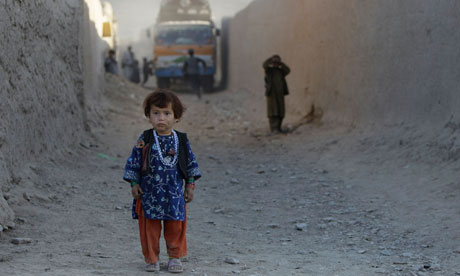
-
-
Saturday 19 February 2011 14.00 GMT
- Article history
-

Five years after Britain deployed forces to Helmand province in Afghanistan it is becoming clear that British and US policies in the country are not helping but setting back development prospects.
Although more children now go to school and health services have improved, it is remarkable how little Afghanistan has progressed, given that it is the world's most aid-dependent country, with 90% of its budget financed by donors. One in five children die before the age of five and one in eight women die from causes related to pregnancy and childbirth.
There are few signs that donor support is improving. Hundreds of millions of dollars are wasted while up to 80% of donations return to donor countries in corporate profits or consultants' salaries.
Aid itself has become militarised. Nato's use of the military to deliver much of the aid – essentially as part of its counterinsurgency strategy – turns aid personal and projects into targets for the insurgents. It doesn't help that CIA agents also use aid teams as cover to gather intelligence. Unicef has reported that military operations are making more than 40% of the country inaccessible to humanitarian workers for extended periods. Thus military operations, far from paving the way for development, are undermining it.
The UN security council says that 25 times as many Afghans die every year from poor nutrition and poverty as from the war; yet Britain has spent 10 times more on military operations than on development (for the US, it is 20 times as much). Afghanistan has become the most militarised country on Earth, where the government spends nearly half its entire budget on "security". Britain exported to a country already awash with arms £34m worth of military equipment, including more than 18,000 assault rifles, between 2008 and 2010.
Using aid money, from 2004 to 2009 the Foreign Office and the Department for International Development spent £69m on the "shadow army" of private military companies providing "security" and "combat support" to regular forces. These companies have considerable immunity from criminal prosecution but the British government has refused to ban or even regulate them.
Nato has also spent hundreds of millions of dollars recruiting and arming more than 1,000 illegal "armed support groups" to provide security at bases and escort convoys – militias often run by former military commanders responsible for human rights abuses or involved in the drugs trade. Alongside them are thousands of CIA-backed paramilitaries, working closely with US special forces, some of whom are accused of being little more than death squads.
A reduction in the number of civilian deaths would be the one sign of progress, yet the number has increased every year since 2006, and a third of the nearly 10,000 total are attributable to Nato or Afghan government forces. A confidential US military report in 2009 conceded that Nato was causing "unnecessary collateral damage"; but policies causing civilian deaths continue, notably the use of drones for surveillance and "targeted" killings – though they mainly kill civilians.
It is not just the Taliban but also western forces who are holding back the prospects for the next generation of Afghans. Yet our leaders keep troops there. As the defence secretary, Liam Fox, said recently, this is because a withdrawal of troops would "damage the credibility of Nato". Similarly, the chief of the general staff, General David Richards, told Chatham House in 2009 that a key issue was the "grand strategic impact on the UK's authority and reputation in the world of the defeat of the British armed forces and its impact on public sentiment in the UK". The British exit is being delayed by British imperial hubris.
Helping Afghanistan develop means not only facing up to a withdrawal of troops. There is also an even more immediate need to stop the drone attacks, end the backing of militias, regulate private armies, close the secret torture network and stop selling arms.

No comments:
Post a Comment